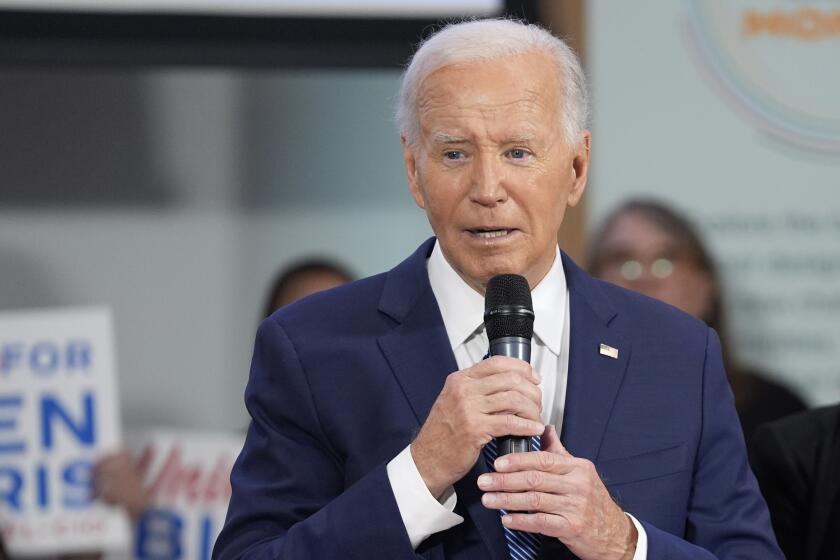Column: America doesn’t have to get worse. Can we heed the warning of Trump assassination attempt?

- Share via
MILWAUKEE — The attempted assassination of former President Trump was shocking but not altogether surprising.
Shocking because violence is no way for a civilized people to mediate their political differences.
Not altogether surprising because the proliferation of guns and incendiary political rhetoric over the past few decades — and especially the last few bilious years — made the shooting at a Trump rally in Butler, Pa., seemingly just a matter of time.
America is a nation steeped in gore. Mass shootings scarcely register anymore, unless the death toll reaches a certain sanguinary level.
Our blood-engorged media — video games, music, the big and small screens — don’t just normalize violence but glamorize and celebrate it.
The obvious and immediate question is where a country so jaded and so sharply divided against itself goes from here.
Sometimes an event is so startling and produces such a shock to the central nervous system that it ceases our political and culture wars and yields a period of inward reflection.
Is Joe Biden the Democrats’ best hope of beating Donald Trump, or would Vice President Kamala Harris be better? Two Times columnists differ on how to handle the party’s troubles.
The Sept. 11 terrorist attacks were one such moment.
Lawmakers of various political stripes gathered on the steps of the U.S. Capitol to join in a moving, heartfelt rendition of “God Bless America.”
For weeks after, political rhetoric in Congress and on the campaign trail was toned down, as the country had no stomach for nastiness-as-usual.
But the cessation of hostilities proved fleeting.
The horror wrought on New York City, Washington and Shanksville, Pa., by a fleet of hijacked airliners turned from a come-together moment of shared outrage and resolve to a partisan bludgeon, used mainly by President George W. Bush to promote his reelection bid.
Maybe this time will be different — though it seems unlikely.
The immediate aftermath of the failed attempt on Trump’s life was familiar in ways both heartening and dismal.
President Biden, who couldn’t bring himself to shake Trump’s hand at last month’s debate, called his Republican opponent and expressed relief that he was alive and safe.
“Everybody must condemn” the sick attack, the president said. “We must unite as one nation.”
In a Sunday night speech from the Oval Office, Biden deplored the assassination attempt.
“We cannot, we must not, go down this road in America,” he said in a national address. “There is no place in America for this kind of violence, for any violence ever. Period. No exceptions.”
Trump posted a similar call for national reconciliation on his social media site, urging citizens to “stand United, and show our True Character as Americans.”
“We can’t go on like this as a society,” House Speaker Mike Johnson, a Trump loyalist to the core, said in his own call for greater civility. “We’ve got to turn the temperature down in this country. And we need leaders of all parties on both sides to call that out.”
Those were healing gestures at a time of deep disquiet.
But the first fragmentary accounts from rural Pennsylvania had barely registered when the uglier side of our politics emerged in a barrage of reckless and combustible claims about a “false flag” operation, a “deep state” conspiracy and, most egregious, assertions that Biden was behind the assassination attempt.
“Joe Biden sent the orders,” said Rep. Mike Collins (R-Ga.), who called for the president’s criminal prosecution.
It wasn’t, however, just the screw-loose wing of the Republican Party that sought to turn the attempted killing into political fodder.
Many were shocked that a presidential contender could be shot. Few were surprised that a lone gunman in the U.S. could wreak havoc in an instant. What comes next?
Ohio Sen. J.D. Vance, Trump’s choice as running mate, asserted that “the central premise of the Biden campaign is that President Donald Trump is an authoritarian fascist who must be stopped at all costs.
“That rhetoric,” said Vance, deep in his audition, “led directly to President Trump’s attempted assassination.”
Even Trump, not withstanding his soothing words, seemingly couldn’t help himself.
After a pliant federal judge threw out the charges in the ex-president’s classified documents case, Trump responded Monday with a bristling — and decidedly non-magnanimous — posting on his Truth Social media platform.
“As we move forward in Uniting our Nation after the horrific events on Saturday, this dismissal of the Lawless Indictment in Florida should be just the first step, followed quickly by the dismissal of ALL the Witch Hunts, The January 6th Hoax in Washington, D.C., the Manhattan D.A.’s Zombie Case, the New York A.G. Scam” and on, Trump wrote.
No political figure of the past generation has done more to coarsen the nation’s politics, lower the bar for acceptable discourse and promote political violence than the 45th president.
The fact that someone — whose motive and ideology remain unclear — sought to end his life has led to inevitable gibes about roosting chickens. But that sort of talk serves only to escalate tensions, widen our divisions and push the country closer to a political breaking point.
It doesn’t have to be that way.
Politics is a rough business, and there is a place for spirited, even scathing debate. Politicians shouldn’t shrink from the fight, and voters shouldn’t hesitate to terminate the careers of those they find distasteful or with whom they disagree.
But the instrument must always be ballots, not bullets.
More to Read
Get the L.A. Times Politics newsletter
Deeply reported insights into legislation, politics and policy from Sacramento, Washington and beyond. In your inbox three times per week.
You may occasionally receive promotional content from the Los Angeles Times.













